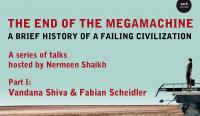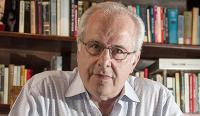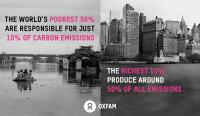In order to maintain a chance of limiting global warming to two degrees, industrialized nations must reduce their emissions by 80 percent by 2030. However, according to Fabian Scheidler, this is only realistic if, in addition to switching to renewable energies, overproduction and overconsumption are reduced, especially among the wealthy classes. In the transport sector, for example, a drastic reduction in traffic is needed through public transport and other settlement structures. The aim is to create a progressive vision for a better life in which needs such as mobility are met with much less material and energy input. The climate crisis is not the only threat to life on Earth; the extinction of species is just as dangerous. This is another reason why overproduction must be overcome. As poorer people are barely able to limit their consumption, it is necessary to take resources from the top 20 percent, who are responsible for 80 percent of environmental consumption, and redistribute them. This requires a convergence of ecological and social movements that work together to prepare for future crises.
Noam Chomsky, linguist and author of more than 100 books, University of Arizona
Fabian Scheidler, co-founder of Kontext TV, author of "The End of the Megamachine. A Brief History of a Failing Civilization"
Moderated by Nermeen Shaikh, co-host of Democracynow
Nermeen Shaikh: Fabian, the last word to you: how to exit the megamachine and in particular what professor Chomsky was talking about, the climate catastrophe, which you also mentioned earlier.
Fabian Scheidler: Yes, I completely agree with Noam that we need fast solutions even within the scope of the capitalist system. And we need a progressive Green New Deal with very ambitious numbers and a very fast track. Some climate scientists like Kevin Anderson even say that we need to go down in the industrialized world by 80 percent of our emissions until 2030. Take the car industry as an example. If you have a very mild Green New Deal, then we will have big Tesla cars replacing the combustive engines. And we know that electric cars need a lot of CO2 emissions in their production, for the batteries especially. So if you replace the car system as it is today only by electrical vehicles you don't really solve the problem. You can save some emissions but you don't go down by 50 or 80 percent until 2030. So we also need to start to think in another logic. And in terms of cars and traffic, there are a lot of very well detailed proposals to do that, to have more public transport instead of cars. There are cities in Spain for example where cars are banned from the inner cities. And it works very well in Grenoble in France. So you need a very progressive plan with a positive perspective for the people. For example getting out the cars from the cities can improve our living conditions, can improve our health, children can play in the streets. You need a progressive vision for a better world where you can have the needs, transport for example, satisfied with less production, less production of cars. So I think we need both, we need a technical revolution replacing fossil energies by renewable energies, and at the same time we have to make steps to a logic of better living with less goods. Because at the end of the day, we have a huge overproduction. And it's not only the climate crisis. We have caused the sixth big species extinction in the history of the planet. There were five big extinction events, the last one being 65 million ago when the dinosaurs were almost wiped out. And this species extinction would happen even without climate change. So it's also the whole system of overproduction that has to be changed. And I completely agree with Noam that this is a class question, it's a class strugglehere, because the overproducers and overconsumers are the richest 20 percent of the planet, mostly in the industrial world. Those people have to go down with their production and consumption. The poor people cannot consume less, they can consume in a different way, but not less. So we have to face the fact that climate justice is also about distribution, it is about taking away resources from the rich and distributing it more evenly, so eight billion people can live in a decent way on this planet without destroying it. I think we also have to be clear that the path we are facing will not be a linear, smooth way. For progressive movements, I think it's very important to get prepared for crises, like the crisis of 2008, like the corona crisis, because in this type of crisis the elites also have problems, they have to justify huge amounts of money that they put in one direction and not in another direction. In the corona crisis we would have had the possibility to put all the money not into Boeing, the aviation industry, the car industry and Wall Street – which was the bailout plan that was actually imposed. If we had social movements on a higher level we could shift the situation in a way that the money is channeled in a different direction. But learning from one crisis means to be prepared for the next crisis, to grow stronger. And I think there are signs that this can happen, for example with the convergence of the Bernie Sanders campaign with Black Lives Matter, with the climate movement, which has been very strong before the corona crisis and I think it will re-emerge. I think the convergence of these struggles is very important. The social justice issues and the environmental issues can only go together. We can solve this crisis only when we address both issues at the same time.
Nermeen Shaikh: Well, Fabian, thank you so much, professor Chomsky, thank you so much for this conversation.





